Schooling often gets the reputation for being the most formative time in someone’s life. That’s a pretty big deal. A school website must communicate the establishment’s ability to provide that experience for each potential student.
But what information do you need to include in these niche digital designs? What kind of features should be present on a school website? And how do you set yourselves apart from the competition? Big questions, but we’re here to answer…
What makes a good school website?
A good school website does justice to what the school offers in terms of academics, teachers, range of co-curricular activities, and the facilities available. Achieving this means adding all the relevant info to your site in the most engaging, appealing format for your intended audience.
Monopolize on-site interactivity with features such as:
- effective, concise copy
- appropriate, high-definition imagery
- curated videography
- structured, consistent, and accessible layout
We explore what it means to have a great school website in 2022, feature by feature.
1. Keep the audience in mind
A school website caters to prospective students, nurtures existing student and parent communications and their ease of access. By keeping parents up-to-date about school events and reports on the child’s progress, a school keeps the parents in the loop of their children’s education.
This can be done by showing details of up-and-coming events, providing links to newsletters, and redirecting parents to external course management portals where they can keep a track of their children’s assessments, examinations, and grades.
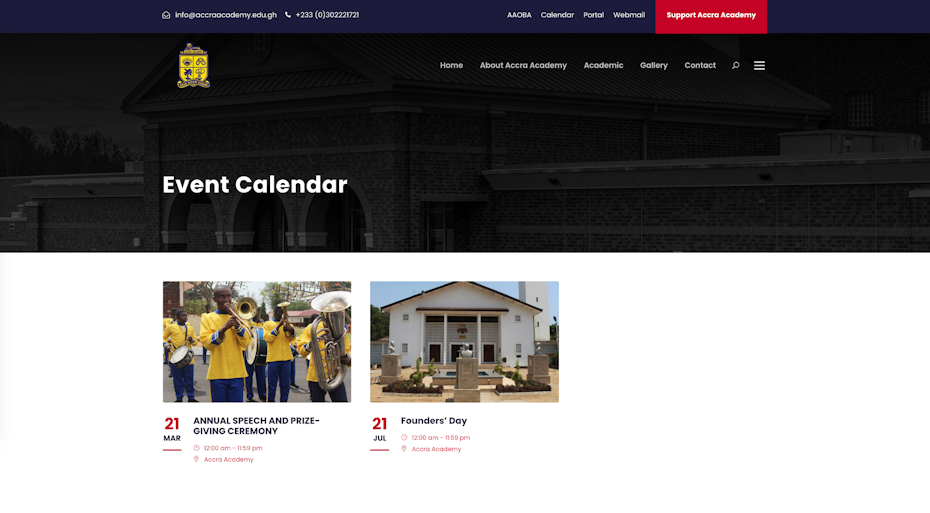
2. Adapt to current trends
One domino effect of the pandemic was to bolster the need for a school’s online presence. It’s the first point of call to keep parents and students updated with any changes in policies, learning formats, and exams.
Many classes have gone online, meaning it’s imperative to include a section on your school website detailing how your establishment is adapting.
This design combines the sentiment of ‘togetherness’ with the concept of ‘distance learning, to comfort users who may be anxious about this dramatic change in teaching styles. By including a picture of graduates at the ceremony and using 1st pronouns in discussing “our students and families”, the school implies their values of trust, intimacy, and a promise that no matter what happens, they will support their students to succeed.

3. Communicate your ideals
Every school has its own story and unique qualities. These differences can significantly impact the decisions of potential students. By assigning space on your website to communicate your vision, mission, heritage, and history, you successfully manage to give an essence of what your institution stands for.
You can also talk about your accomplishments, educational standards, and affiliations in the same section; add photographs of your students and the administrative committee to make your content more relatable.
Many parents and students are keen on the spiritual growth that comes with the religious affiliations of their desired school. If your school is a madrasa, Adventist, Catholic, or another type of religious institution, make sure to mention it on your website’s “about” section with more details regarding how faith is followed, taught, and celebrated.
Keeping the information next to other important headers like the principal’s message, publications, community on your website, as shown below, you can boldly announce your spiritual stance.
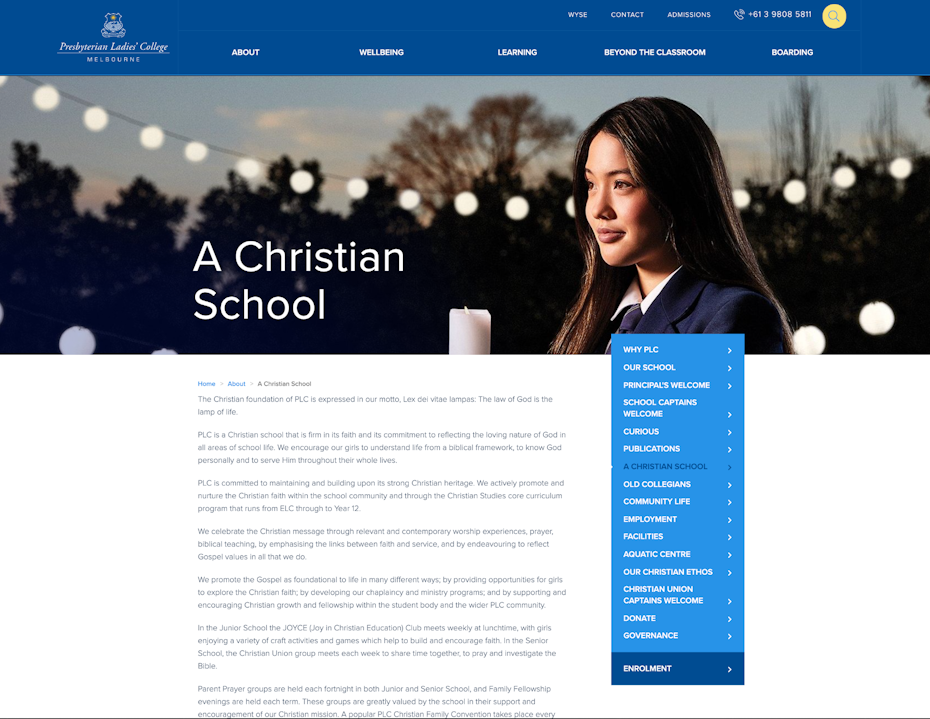
4. Showcase your facilities
A big factor that influences prospective students and job applicants at your school is your infrastructure. Facilities impact student morale, well-being, and learning pace, which is why you need to boast about them on your school website!
Galleries, videos, and infographics are your friends in this matter. Even showcasing your cafeteria menu is a great idea to communicate your values and dedication to enriching students’ diets.

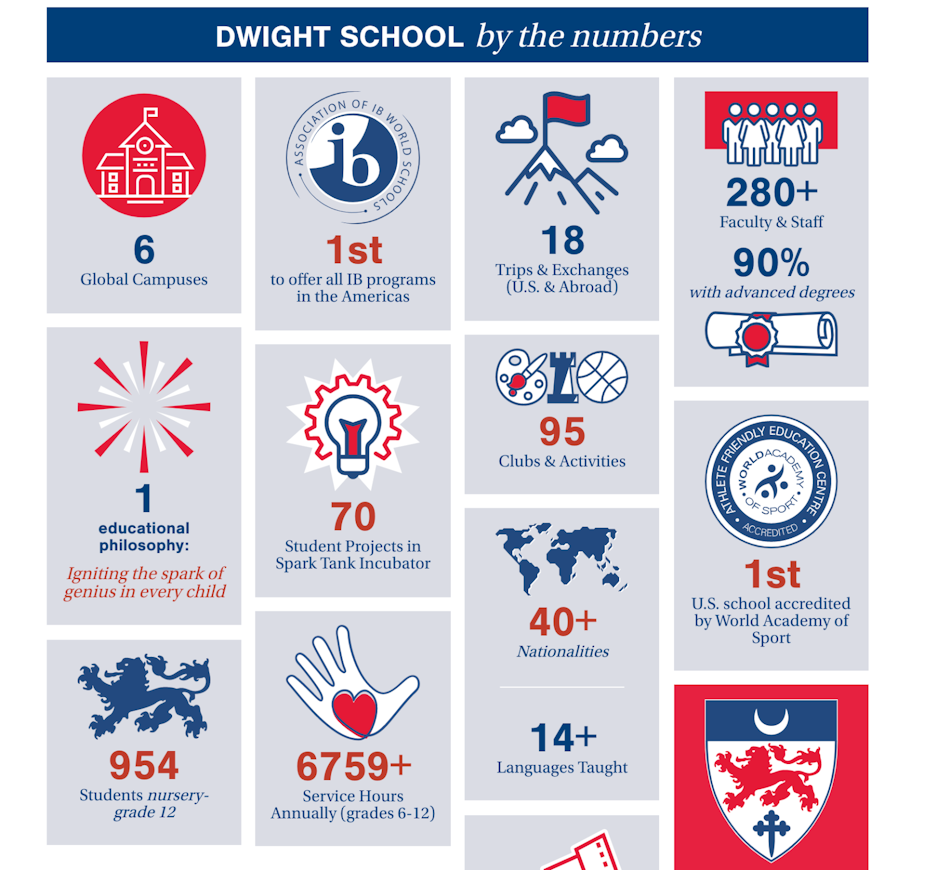
Creative ways such as infographics, data visualization techniques like charts and graphs, are becoming more and more popular to showcase statistical and quantitative data relating to your school.
5. Introduce virtual tours
Another way to show your school’s infrastructure is through providing images and virtual tours directly on your website. It grants users an opportunity to explore the school campus as if they were actually there, in person. This makes their experience using the site memorable and, if it’s done well, can be a really positive and exciting experience, which reflects the sophisticated and professional reputation of the school.
So to do this, you’re going to need to implement virtual tour software using HD footage. This will give users a panoramic view and enable them to direct how they move around the tour. Keep in mind loading times when implementing this onto your site; of course, if you’re working with a designer, they should be doing this anyway.
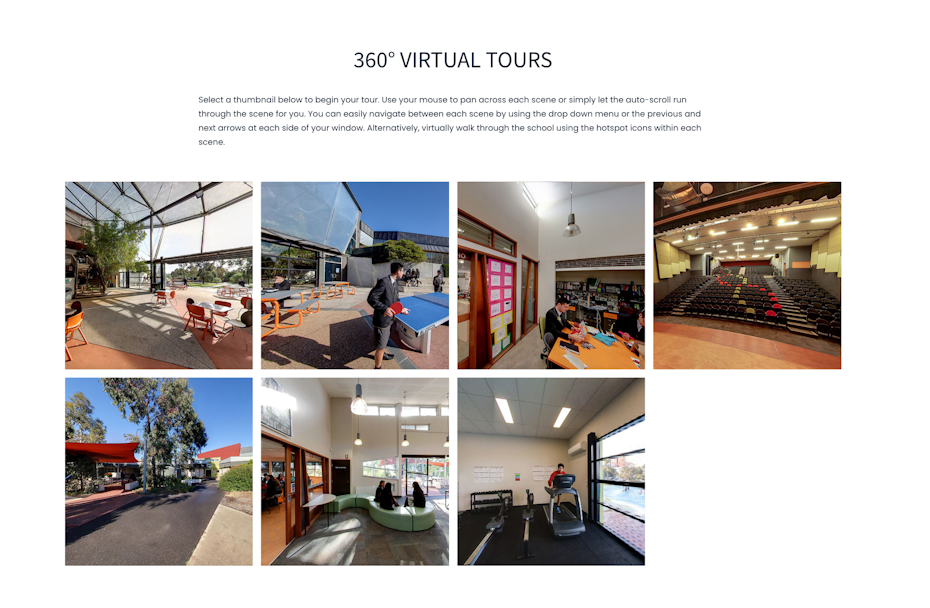
6. Bring assurance through your faculty
The most valuable asset of a school is its teachers. Being truthful about their expertise and credentials can create trust and personal connection between the viewer and the school. This can be done by creating an effective faculty information area within your school website where people can view and read more about the teachers, their qualifications and expertise.

7. Entice visitors with clubs and activities
Apart from the physical attractions, a school brings value to its students through the events, clubs, and activities they offer. These activities inculcate values such as teamwork, responsibilities, healthy competition, cultural awareness, and diversity. Hence, extracurriculars are considered vital for any school. Clearly mentioning them on your website can attract students who are specifically interested in them and also attract faculty for different specialties.

Academic, cultural, and sporting activities on the website via Korowa Anglican Girls’ School
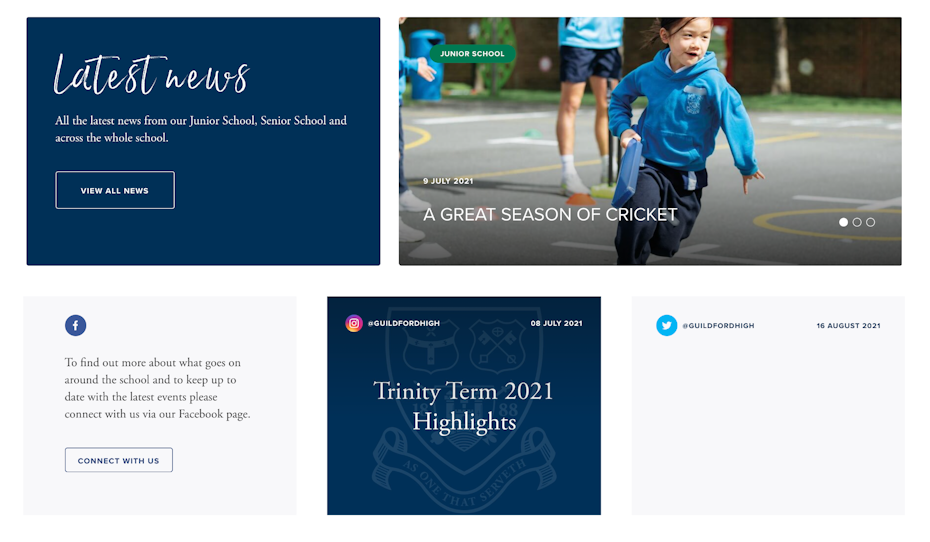
Having a gallery of different parts of the school that can be clicked to view its 360° tour can also be a quick way to look around via Suzanne Cory High School
If your school specializes in a specific activity or skill, giving details relating to that area can really help give the attention it deserves. If athletics is your school’s forte, flaunt your medals, student achievements, and sports fields on a dedicated section on your website. The following example glorifies their antique collection of varied violin, viola, and cello models in the music and arts section of the website. Doing this helps students wanting to hone those skills get more enthusiastic and willing to join in and learn!
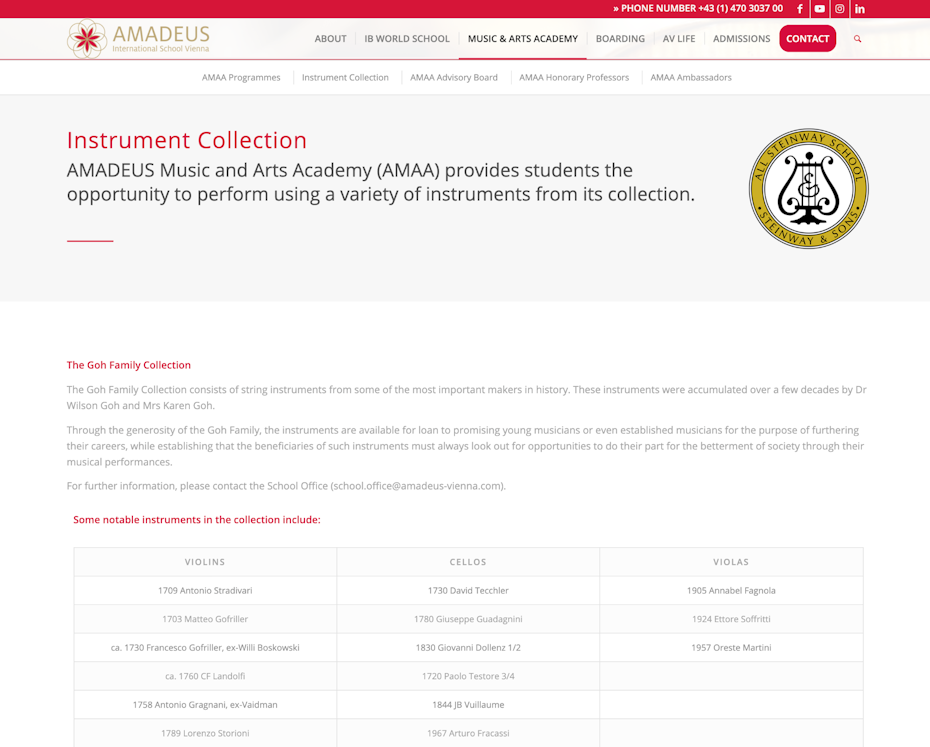
8. Invite applications for admissions
Choosing and enrolling in schools go hand in hand. Your school website must have details regarding admissions in order to convert prospective students into future students. The website below is a great example of how you can be transparent and clear about your admission process while using visual tools like collaging and infographics to keep the mood light, friendly, and creative.

Upon giving this information on your website, make sure to mention the requirements for entry, eligibility, pre-requisites, fee, and a link to the application form. With digitalization happening at a speedy rate, school applications are also transitioning to digital forms that store your student information in digital databases for easier access in the future. These forms can either be built by web professionals using code or you can add them yourself by using online form builders like Typeform.
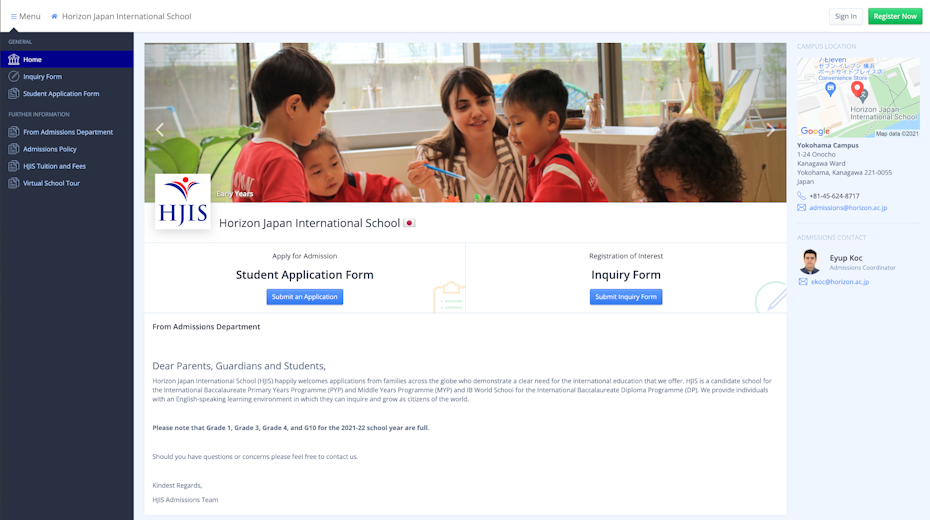
9. Simplify contact methods
There could be multiple reasons for someone to contact your school. These include inquiries regarding admission, boarding facilities, complaints or simply seeking more information. To make it simpler for your visitor, it is best to have a contact form, a location map to your physical location, and a number to call on your contact page.


Ensure to keep your “Contact us” button explicitly visible to make it simpler and less intimidating for your visitor to contact you. Welcome communication with users and invite conversation by allowing them to see your location or fill in a simple form on your page. This is also a great opportunity to encourage readers to sign up for your mailing list!
10. Foster an alumni community
A school highly benefits from its alumni as they embody a model community and representation of your brand or school.
Alumni create a culture of conducting reunions, bring in business partnerships and investors to the school and create career opportunities for the existing students. Therefore, it is important to foster communication between your school and its graduates. This can be done by dedicating an alumni section or page on your school website, providing them with current school updates, and hosting events that are specifically tailored for them.

Alumni are prime candidates to give glowing testimonials for your school. This adds credibility, strengthens reputation, and allows student voices to be heard for your educational brand.
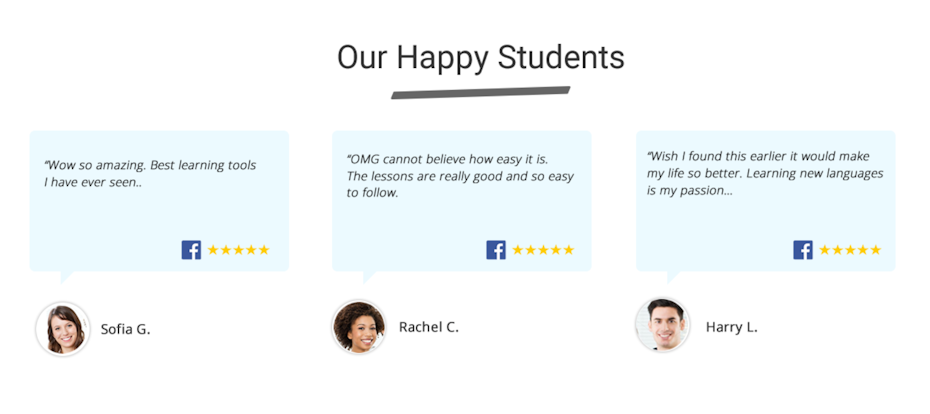
11. Show off career opportunities
Acquiring high-quality teachers and staff can be difficult for schools, which tend to take additional efforts to recruit staff. Make it easy for any potential staff that lands on your website to apply by giving clear information about any available, current positions in a dedicated “recruitment” area of the site.
Experiment with formats and tables to present technical information such as the required qualifications for such roles, any perks your company offers, and information about the working culture. You can also link each open job opportunity to external application forms and job hiring websites like LinkedIn.

12. Invite investment and funding
Flex your creativity when trying to attract new opportunities and charity funds for your school—just because it’s a school website doesn’t mean it has to be constantly serious. Show off your brand personality and add a light-hearted atmosphere to such spaces, while ensuring your CTA button is practically leaping off the page and into your target users’ palms.

13. Describe your niche
Say you’re offering evening language classes, your school website needs to communicate this and sell its benefits. Show what you can offer students and how you can positively impact their lives. Video testimonials are really effective for this type of motivational purpose.
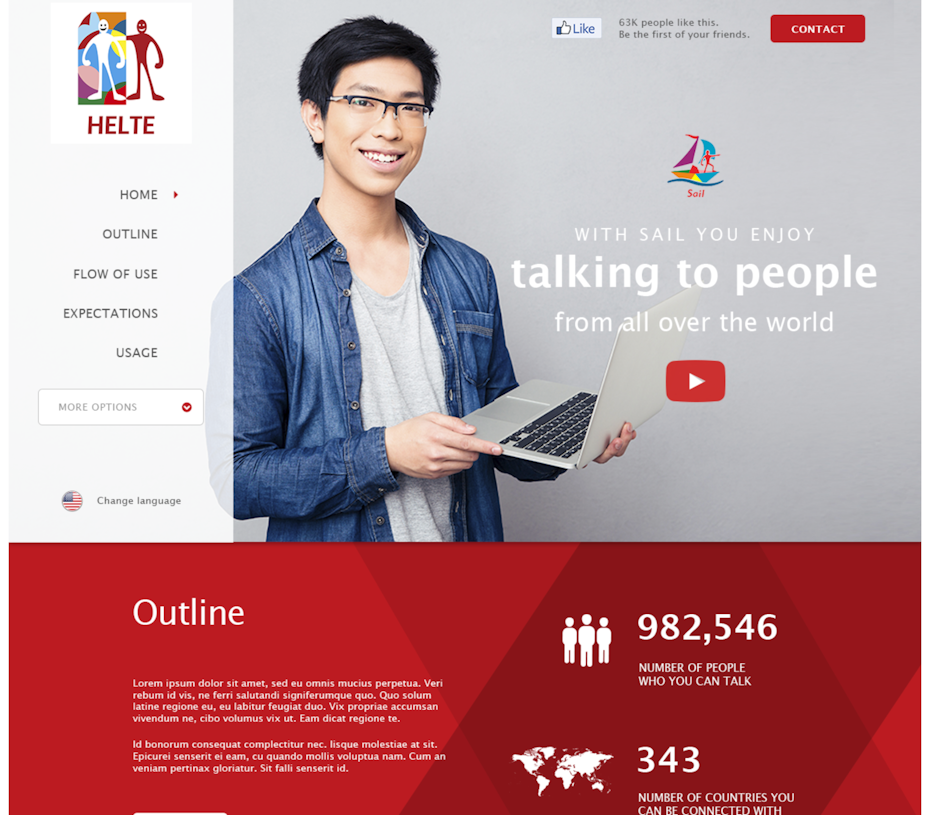
14. Experiment with a video landing page
Having videography on your landing page not only summarises your school’s services and values but it engages your audience positively and encourages them to create long-lasting memories on your site. In landing-page-position, this is the prime spot to impress visitors to your school website.

15. Be consistent with branding
Your school needs to deliver a consistent message through its website that aligns with its brand and core values. This is best done by standardizing branding elements and creating design systems, which are followed throughout your website. Doing this will improve the experience of your visitors and make it memorable.


Your brand can be built upon various factors such as your school’s target age group, value proposition, religious and national affiliations, and much more. The example below shows how a website can be branded to suit kindergarten and primary schools. It uses a vibrant color palette with adorable illustrations and carefree font that add its distinct childlike design style.
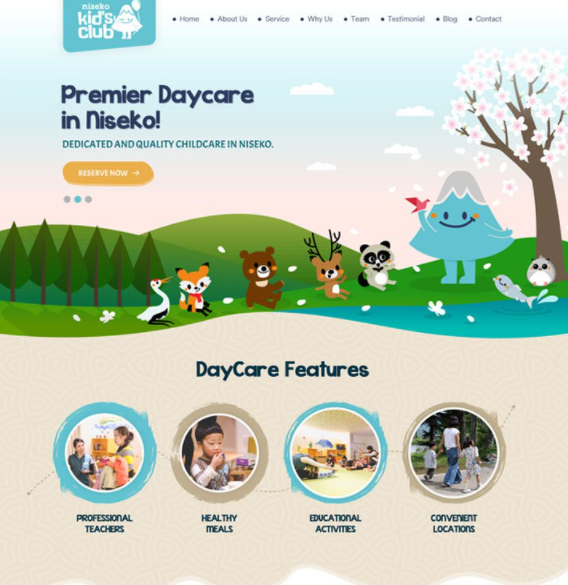
16. Great interactivity
To make your design memorable and leave a lasting impression on your visitors, consider adding interactivity to your page. Personalized marketing efforts and effective interactive elements like animated components that react to user’s input, interactive infographics, and videography can create a great relationship with the visitor. It has a higher chance of them picking your school.

17. Accessibility
To make your website easy to navigate to people of all abilities, it is important to make it WCAG compliant.
There are numerous ways to increase the accessibility of your digital designs. One simple way is to ensure all your copy is designed with scalability and contrast in mind; this is to ensure it’ll adapt well to screen-magnifiers. Another super simple tip is to enable the keyboard navigation option, making your website easy to use without needing a mouse.
Ensure your designer is up to date on research and practices surrounding accessible digital designs. If your school website doesn’t transparently demonstrate and reflect your dedication to creating accessible learning environments for all, you’ll have a much harder job in gaining trust and respect from your audiences.
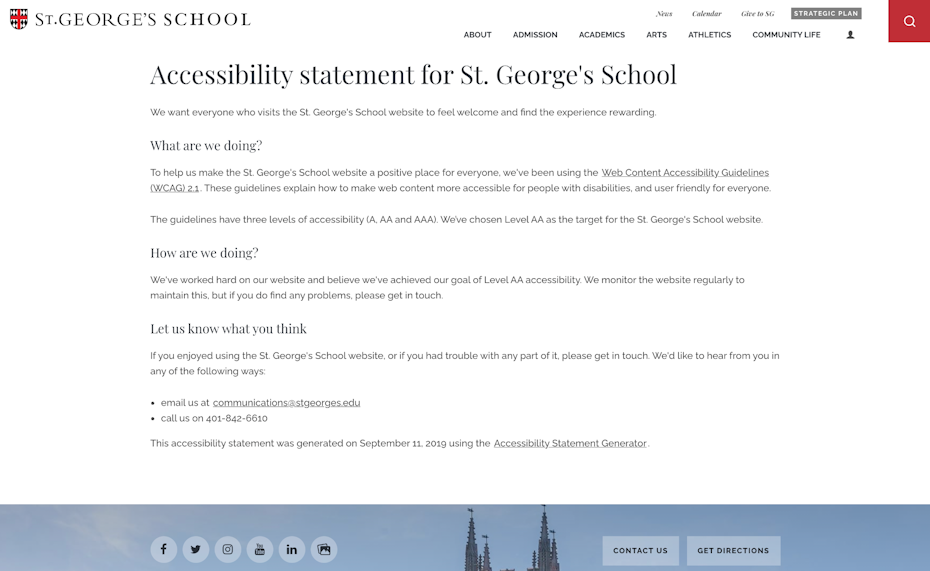
18. Include language options
Offering multiple language options to visitors on your site welcomes them, no matter their culture or ethnicity, to your community. It creates a warm, inclusive environment and is pretty simple to achieve. Add a drop-down menu that lists all the languages that are available and ensure your translations are accurate and thorough.

19. Great information architecture
Present information clearly by keeping hierarchy at the forefront of your mind throughout the design process.
Use a logical pattern across pages and keep your school website’s structure simple by reducing nested links, organizing URLs, and using design tactics to make CTAs stand out. Ideally, your site will be easy to navigate and scan, so make use of effective grid structures.
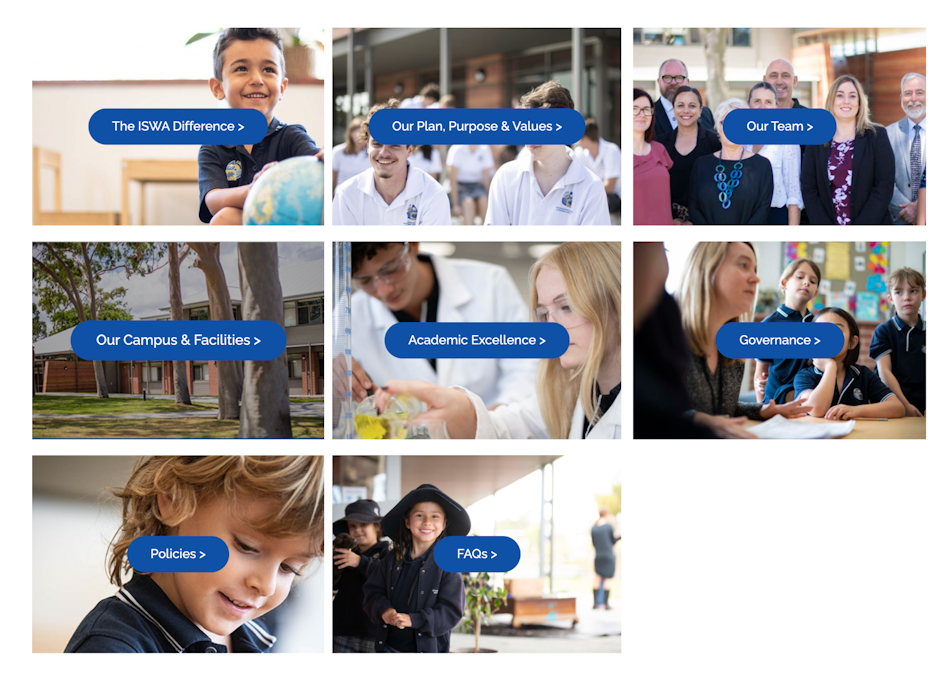
20. Finishing with a gold star
By looking at what works in the above school websites, we understand how important it is for schools to have an online presence. It strengthens branding, creates a space for existing students, and invites potential students and staff to check out the establishment.




